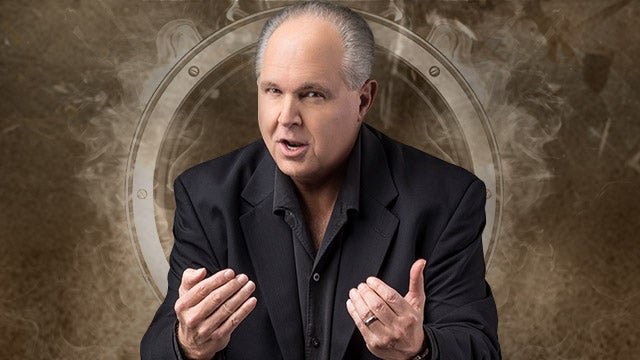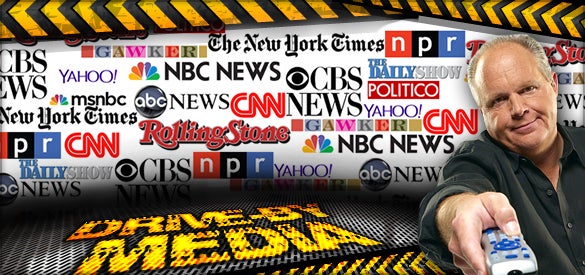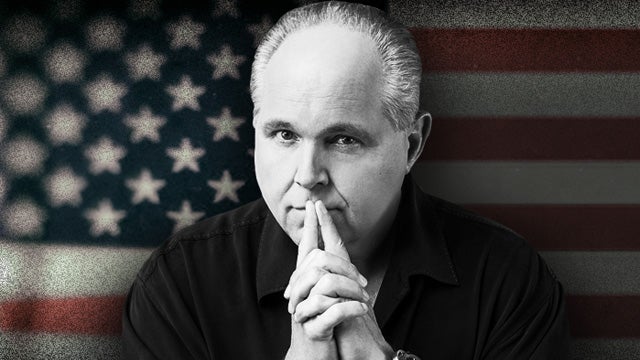RUSH: I have a good friend in journalism — I really do — and my good friend in journalism is distressed, and here is the perspective. You know, until he mentioned this to me, I hadn’t thought of it this way. But he actually loved journalism, and he considers one of the golden ages of journalism to have been the days when there were just the three networks.
I’m not talking about from a liberal journalism or liberal bias standpoint, but rather an era where journalism was respected and the people who did it might have had liberal bias, but they were respected. They were not joked about and discarded like the people on CNN today are, like the people at MSNBC are today. I mean, Huntley, Brinkley, Cronkite, Eric Sevareid doing commentary with his bad teeth. They were yellow. They had spaces between ’em. He was a World War II correspondent. Nevertheless, he was a revered commentary guy during Cronkite’s news.

And then you had Howard K. Smith and maybe even Peter Jennings over on ABC. Everybody knew that they were liberal; everybody knew they had a left-wing bias. But in those days, if you rose to the ranks, if you rose to the highest ranks, you really had accomplished something. It was very hard to do. Those jobs were very rare because there aren’t very many of them. There wasn’t any cable news. It was just the three networks. Maybe PBS. You had the MacNeil/Lehrer NewsHour.
And like anybody that goes into any business, when you go into it when you’re young and that business is highly respected and you want to reach the pinnacle of it, you want the business where you succeed to be respected so that your achievements in it are not only acknowledged by others, but known by you to be serious, and it’s something that has been very hard to do that you’ve pulled off. And my journalist buddy today, he’s distressed by this. He’s been distressed the past two years.
He’s aware that the media stopped being media when Trump was elected, and maybe even before. But that they became complicit with the intelligence community and with the Department of Justice and with the Clinton campaign. They became complicit in a political effort to destroy Trump. In this case, the opposing candidate. As all this has happened, the respect that people hold for journalism in general and journalists specifically has plummeted, and it really distresses him, because he has not joined this fray. He is not complicit in this.
He is repulsed by what he has seen happen to journalism. And I heard from him after this Washington Post bombshell last night, which is so clearly a setup. It’s the special counsel office leaking to the Post the night before Barr is to testify. It’s designed to impugn Barr’s reputation. It’s designed to create a lie in the minds of people that consume journalism.
They’re actually trying to make people think that Mueller found collusion and that the attorney general is lying about it. And it just repulses him. Even people where he works are falling prey to this. He feels like a lone voice. And it’s not that he can’t deal with it where he works. It’s just that he’s distressed by what’s happening to the business that he wants to excel in.
It’s like anything else. Like I’m in talk radio. I want radio to have a decent reputation when I’m working in it. If you play Major League Baseball, you want Major League Baseball to be a pinnacle. You want the best people in the world playing so that your achievements there are measured against the best. And this guy wants his achievements and his body of work to be measured against the best, and it’s not being.
His business has become a bunch of hacks. “Sad to see the whole industry jump on this Washington Post letter to make a day of news out of it. All of these journalists saying that Barr should be impeached, that Barr should be in jail,” he said, “People that do what I do are losing it! I work with some of them who are losing it. I’m surrounded by people — Barr should be in jail? Barr should be impeached? These are journalists saying this?”
And I did my best to console him. I said, “Look, you have a singular opportunity to stand out here. Because your industry has indeed been corrupted. And I’ll tell you, the corruption has been long building. But I’ll tell you when it was cemented. This is arguable because you may find previous events, and I’m sure you could, but I think the journalism industry became full-fledged totally incorrigibly corrupted when they decided to be complicit in this effort to get rid of Trump.”
When Jim Rutenberg of the New York Times wrote that column that the Times published in which he said we need to throw out the principles of journalism we’ve all followed in covering Donald Trump, that he’s such scum that we now have to engage in the effort to get rid of him. I’m paraphrasing, but Rutenberg, since it was in the New York Times, it was kind of like a license for everybody else in journalism to throw aside, to cast aside all of the principles and join the effort to overturn the election results of 2016.
And so what’s happened? Two years, two or more years now of their lives, their professional lives have essentially been wiped out by virtue of their abject failure to get rid of Trump. That’s what their jobs became, and they have failed. And they know it. And they are livid. And they’re angry, and they’re depressed. And they can’t give it up.
And by jumping on this Washington Post letter last night and misrepresenting what it says and misrepresenting what Mueller is saying, by trying to continue this lie that Mueller found collusion and that Barr is covering it up because he wants to cover for Trump, I mean, there’s no truth to this. It’s a wild, insane allegation. And they’ve all glommed onto it.

By jumping on this letter, they have decided to continue their complicity with the Washington estate, the administrative state, whatever, to get rid of Donald Trump. These people used to think that their job was to hold the powerful accountable, to make the powerful and the comfortable uncomfortable. But they’ve made the decision to join the powerful. And I think actually that happened long before this.
As I say, you can probably come up with examples of their full-fledged corruption long before this, but regardless, this cements it. And the fact that they can’t give it up, the fact that all Mueller had to do was leak this letter knowing full well the Washington Post would publish it, the rest of journalism would glom onto this and try to create yet another demonstrably fake news cycle.
So I understand the guy’s lament. He wants to be a gigantic success in journalism, and if he pulls that off, what’s the big deal? Because journalism stinks now. Journalism’s not held in nearly the regard that it once was. Look, the bottom line, before we go to the break. Robert Mueller was not saying that Barr’s letter, the four-page summary, was inaccurate. Robert Mueller was worried about media coverage and whether his narrative would dictate it.
Mueller wanted the 487 pages of this report of his to be the media narrative. He wanted the media to be able to report in such a way that people thought Trump colluded when the report said that he didn’t.
BREAK TRANSCRIPT
RUSH: Livermore, California, you’re next, it’s great to have you with us, sir. Hi.
CALLER: Rush, stumbling-into-the-truth dittos and I say that because, as you mentioned earlier, we were talking about the three networks and your friend who’s a journalist, and I stumbled into the truth I think, Rush, and it goes something like this. The NFL and Major League Baseball are very reluctant to add teams to their leagues less they suffer diluting of talent. And your friend was talking about the time of the three networks, even though those broadcasters were typically lefties, you had a higher quality because, as you mentioned, there were lesser spots, so you really had to be good to get there.
RUSH: Yep.
CALLER: Now with 24 news on these cable channels, they feel they have to fill this stuff up with the internet, with all of these almost unlimited slots we’re getting, you know, Jim Acostas and Rachel Maddows and all of these fruitcakes as reporters where they wouldn’t have made it in the old structure.
RUSH: That’s exactly my point. Another way of saying this is what is the achievement of reaching the pinnacle of something when anybody thinks they can do it and has a chance to? And you’re right. 24/7 news, the blogosphere, social media, which is based on likes and pretending that you have a red carpet life based on thinking you’re building an audience and you’re becoming a star and pretty much anybody can do it.
 We now have YouTube stars that nobody knows who they are. We have YouTube stars, nobody knows who they are, but we have YouTube stars. I mean, somebody knows who they are, but they’re not stars. But your point is well taken, and it is one of the reasons why they limit expansion of professional sports.
We now have YouTube stars that nobody knows who they are. We have YouTube stars, nobody knows who they are, but we have YouTube stars. I mean, somebody knows who they are, but they’re not stars. But your point is well taken, and it is one of the reasons why they limit expansion of professional sports.
I mean, I don’t think there are enough really good, quality NFL stars to expand the NFL right now and maintain a competitive balance without some of the teams appearing to be not NFL caliber. Minor league baseball is the same thing. And it’s true in any business when you flood the market with jobs that anybody can do regardless of qualifications.


